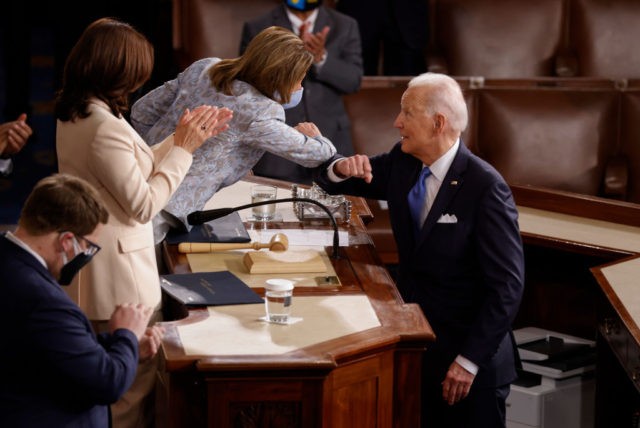CLAIM: “We add two years of universal high-quality pre-school for every 3- and 4-year-olds in America. The research shows that when a young child goes to school—not day care—they are far more likely to graduate from high school and go on to college,” President Joe Biden said in his prepared remarks.
VERDICT: MOSTLY FALSE. A study published in the 2018 Early Childhood Research Quarterly by Mark Lipsey, Dale Farran, and Kelley Durkin found that the evidence does not support Biden’s claim to “add two years of universal high-quality pre-school.”
The Tennessee Voluntary Pre-K Program (VPK) study was the first type of randomized control trial that examined the claim that state pre-k programs have positive achievement. The report found the opposite of Biden’s claim.
There were “positive achievement effects” by the end of the pre-k, but the achievements reversed and began favoring the control group of children in second and third grade.
In addition, the study actually found that kids in the VPK had “more disciplinary infractions and special education placements by 3rd grade than control children.” When the children progressed in their studies, the study found there to be no lasting effects of the VPK on “attendance or retention in the later grades.”
Moreover, the study looked closer at the years after pre-k and kindergarten and found, “the control children caught up with the pre-k participants on those tests and generally surpassed them,” the study continued, “similar results appeared on the 3rd-grade state achievement tests for the full randomized sample – pre-k participants did not perform as well as the control children.”
Brookings expert Grover Whitehurst, in a similar report titled “Does state pre-K improve children’s achievement,” also found “the evidence to support this predicate is weak.”
Whitehurst found:
- no association between states’ federally reported scores on the fourth grade National Assessment of Educational Progress (NAEP) in various years and differences among states in levels of enrollment in their state’s pre-K program five years earlier than each of those years (when the fourth-graders taking NAEP would have been preschoolers);
- positive associations (small and typically not statistically significant) between NAEP scores and earlier pre-K enrollment, when the previous analysis is conducted using NAEP scores that are statistically adjusted to account for differences between the states in the demographic characteristics of students taking NAEP; and
- no association between differences among states in their gains in state pre-K enrollment and their gains in adjusted NAEP scores.
The study said that “under the most favorable scenario for state pre-K that can be constructed from these data, increasing pre-K enrollment by 10 percent would raise a state’s adjusted NAEP scores by a little less than one point five years later and have no influence on the unadjusted NAEP scores.”
The “unabashed enthusiasts for increased investments in state pre-K need to confront the evidence that it does not enhance student achievement meaningfully, if at all,” Whitehurst wrote.

COMMENTS
Please let us know if you're having issues with commenting.